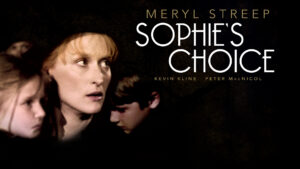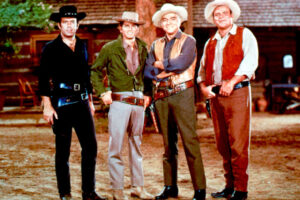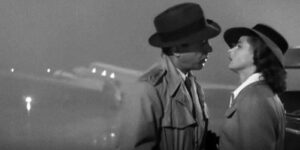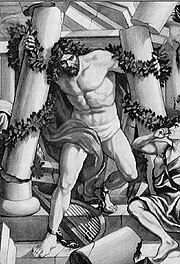by James Scott Bell
@jamesscottbell
 In his famous (or infamous, depending on your point of view) monologue at the 2020 Golden Globes, Ricky Gervais said:
In his famous (or infamous, depending on your point of view) monologue at the 2020 Golden Globes, Ricky Gervais said:
Seriously, most films are awful. Lazy. Remakes, sequels. I’ve heard a rumor there might be a sequel to Sophie’s Choice. I mean, that would be Meryl just going, “Well, it’s gotta be this one then.”
At least Meryl, in the audience cracked a smile…before shaking her head. Me, I was reminded of how the novel William Styron novel tore my guts out. I could not see the movie. Even years later, I still remember the agony I felt reading that book
Such is the power of dilemma in fiction.
A dilemma is a choice between two incompatible and dreadful outcomes. Thus, it tests a character to the limit.
Just the other day I was leisurely watching an episode of Bonanza (Baby Boomers are now humming the opening theme in their heads). For you youngsters, Bonanza was set in the 1860s, and focused on the family Cartwright. Patriarch Ben Cartwright (Lorne Greene) owned a huge spread next to Lake Tahoe, the Ponderosa, along with his sons, Adam (Pernell Roberts), Hoss (Dan Blocker) and “Little Joe” (Michael Landon).

Ben was a paragon of virtue, and in this episode he had been made a judge in Virginia City. An old safecracker Ben knows, Sundown Davis (Tom Tully), cleaned out the Virginia City bank, then turned himself in to Ben. He said he hid the money and promised to give it back if Ben will make sure he goes free.
The townspeople are desperate without their funds. Some won’t be able to feed their families. A big mining company will have to lay off workers.
Ben, however, sees that the law requires a four-time loser like Sundown to be sentenced to a mandatory prison term of twenty years.
Thus, the dilemma. Shall Ben side with the town and all of his friends? Or with his duty to the law?
The bank president sums it up to Ben. “If Sundown goes to prison, this town goes broke.”
The pressure mounts, as citizens press their case to a man they trust.
When the time comes to sentence the prisoner Ben, in his judicial robe, faces the crowded courtroom and explains that what the town is going through is a problem of the moment, but the law is for all time.
He sentences Sundown to twenty years.
The town is in an uproar. Ben becomes a pariah.
But it turns out that Sundown did not rob the bank after all. It was his son-in-law. Sundown took the rap hoping to protect his expectant daughter and her husband. He figured Ben would let him go so the town could survive.
When Ben didn’t do what was planned, the son-in-law starts to crack. His wife tells him he must do the right thing (a dilemma of his own!) He finally breaks down and gives the money back. Ben can now apply leniency so the son-in-law gets out of prison in a few years. He can rejoin his wife and soon-to-be child. And Sundown will be free to enjoy his grandchildren.
Ben’s staunch decision cost him at the time. That’s what a dilemma forces. But then there is a reversal of sorts.
Thus the structure of dilemma: choice, sacrifice, reward.
Sacrifice
The only way out of a dilemma is sacrifice. The hero will be wounded, sometimes fatally, for the choice that has to be made.
That is the power in Casablanca.
Here’s the dilemma. Rick Blaine can have the thing he wants most in the world, Ilsa Lund. She has told Rick she will go with him on the plane to Lisbon, by way of the two Letters of Transit in Rick’s possession.
The other choice is to put Ilsa on the plane with her husband, Victor Laszlo. That means Rick’s certain death at the hands of the Nazis.
 The latter choice is the only moral one. Rick would not just be taking another man’s wife, he would be hurting the war effort by sending a spear through Laszlo’s heart.
The latter choice is the only moral one. Rick would not just be taking another man’s wife, he would be hurting the war effort by sending a spear through Laszlo’s heart.
“You’re part of his work, the thing that keeps him going,” Rick says to Ilsa at the airport.
Rick sacrifices his own happiness and, he understands, his life.
Dilemma is also the power in Shane, my favorite movie.
A mysterious gunfighter is seeking a place of peace to live out the rest of his life, and seemingly finds it with a homesteading family, the Starretts.
But the cattlemen, led by Rufe Ryker, are determined to drive the homesteaders away though violence, intimidation and, if need be, death. When Joe Starrett determines to resist, Ryker hires a gunfighter, Jack Wilson (played by the inimitable Jack Palance) to do some killing.
Shane now has a choice. Go back to his gunfighting ways or move on. Ryker tells Shane he has no quarrel with him, and he can ride out of the valley with “no hard feelings.”
But doing so means the death of Joe Starrett.
**Spoiler alert. If you haven’t seen the movie, watch it ASAP, on a big screen TV**
Shane rides to town for a final showdown with Wilson.
I love this scene. Here’s the clip:
What we find out immediately afterward is that Shane is bleeding, wounded in the side (Biblical quiz: Who else was wounded in the side on behalf of others?)
Outside the saloon, little Joey Starrett sees the wound, and begs Shane to stay.
“A man has to be what he is, Joey.” Shane says. “You can’t break the mold…Now you run on home to your mother, and tell her…tell her everything’s all right and there aren’t any more guns in the valley.”
And he rides off, with Joey shouting, “Shane! Come back!”
What many people miss is the subtle visual after this. Shane’s horse takes him through a graveyard. Shane’s arms are hanging at his sides. Because Shane is dead. (Biblical quiz redux.)
Reward
The hero has the wound, is either dead or alive, but receives a just reward for his moral choice.
Hero Dies
Shane’s sacrifice brings peace to the valley. His memory is carried forward by the boy, Joey, who will grow up “strong and straight” as Shane told him.
Braveheart, William Wallace, has refused to confess, and as he’s disemboweled shouts his final word, “Freedom!” His sacrifice inspires the Scots, under Robert the Bruce, to fight a final battle that wins their independence.
 Samson kills himself kills himself three thousand Philistines by bringing down their temple. He becomes a heroic example for the Israelites.
Samson kills himself kills himself three thousand Philistines by bringing down their temple. He becomes a heroic example for the Israelites.
The Hero Lives
In Casablanca, Rick shoots and kills Major Strasser, the Nazi, in front of the French police captain, Louis, just as a cohort of French police arrives.
Louis tells them, “Round up the usual suspects.”
As the two of them walk off together to join the war effort, Rick has his reward. “Louis, I think this is the beginning of a beautiful friendship.”
At some point in your writing, think about a dilemma. What two choices can you give your hero, both of which carry a cost?
- An immoral choice that would cost the hero spiritually.
- A moral choice that would cost the hero (potentially or actually) his life.
- What reward can the hero receive as a result of the moral choice?
There is perhaps no more powerful trope in fiction than the dilemma. It can raise a cracking good read into one that is unforgettable.
Comments welcome. I’ll be in and out today, and will respond when I can.

The dilemma makes for some of the best reading and watching and Bonanza was great about using that. Just the thought of Bonanza made my day. LOVED that show (well, the Adam years) and I have had a lifelong crush on Adam Cartwright/Pernell Roberts. I still try to watch a little Bonanza almost every weekend. They don’t make ’em like that any more.
Would add that for anyone who hasn’t seen Bonanza and wants to check out an episode, the one that has always stood out to me as the strongest and best was Season 3, episode 28, “The Crucible” featuring Pernell Roberts and Lee Marvin.
The first two lines in the description of Pride’s Children: NETHERWORLD are:
—
Every decision he makes from here on will hurt someone.
Is his happiness even in the equation any more?
—
And the final volume of the trilogy is one hard choice after another, so, yes, dilemmas.
Without conflict, there’s little reason to read. We WANT to see people sort of like us MAKE those hard choices, and live through the consequences, so we can learn what they are made of, and what it costs them.
Maybe we can learn that the hot stove is dangerous without burning our hand.
Oh, goodness. What memories. The first time I saw Shane was at a drive-in theater (for those too young to remember, a drive-in was an outdoor movie theater), then on TV. And I have probably watched every Bonanza at least twice.
The dilemma makes the reader worry about the protagonist…and that’s good.
Sad that we have to define “drive-in theater.” 🙂 Every child should have the experience of piling into the back of a station wagon or pickup truck and going to a movie with parents and friends.
My first theater experiences were at the drive-in, and it holds a special place in my heart for that reason.
Sunday morning Biblical quiz and redux:
Wounded in the side – Jesus – He was wounded for our transgressions
Arms hanging at the side, riding through a cemetery – Judas Iscariot – in remorse, after betraying Jesus, Judas hangs himself in what was later called the Potter’s field for paupers and the unknown.
Have a dilemma-free weekend.
Same answer both times. 😁
Shane dies to bring peace.
The dilemma is the secret sauce!
Indeed!
Great post, Jim. Things I did not know until very recently:
1. Ben Cartwright’s sons each had different mothers, all of whom died of various causes. This sets the theme carried on throughout the series that Ben never had a lasting, successful relationship with a woman.
2. The actor who played Hop Sing, the family cook (Victor Sen Yung), started his career as “Number Two Son”, Jimmy Chan in the Charlie Chan movies. In 1972, he was a passenger on Pacific Airline Flight 710 when it was hijacked and was shot in the crossfire when the FBI stormed the plane. He survived but one other passenger and the two hijackers did not. Then in 1974, he became a bestselling author when he wrote THE GREAT WOK COOKBOOK. We had the cookbook, but we never bought a wok.
3. The Cartwrights always wore the same clothes in every episode to ease the burden of editing what was then the most expensive show on television.
4. Shane is dead in that final scene.
Great trivia, John.
Matt Dillon also wore the same clothes!
Yeah, but I was shocked when they revealed, in later episodes, that his shirt was pink!
My dad loved Bonanza. I used to watch it with him. I don’t remember a thing about most of the episodes. I just remember being with my dad.
I love Casablanca. One of my favorites.
And who can forget Steve McQueen in The Great Escape?
The baseball-thumping scenes when he was in solitary confinement in a 1942 German prison camp say it all. We just knew–at the end–as he threw the ball against the wall again and again and caught it, that he was planning another escape attempt. And another. Even if he died.
That’s what heroes do.
Happy Sunday!
The Magnificent Seven, too!
👍👍👍
The Great Escape is such a terrific film and shows both outcomes for its ensemble of heroes: many die, and others, like McQueen’s hero, continue in their fight against the Germans.
Jim, I think you’ve hit on the key to why many contemporary stories don’t resonate. Often they are about selfish characters acting in selfish ways w/o any concept of sacrifice. The only greater good they’re concerned about is how they can come out on top and smirk about it.
Thanks for a thought-provoking post.
👍
Great thought-provoking examples, Jim. We often talk about the need for conflict in writing, and you’ve shown the most powerful conflict is within.
I didn’t realize Shane was dead at the end of the movie. I need to watch it again.
I was fortunate to see it on a big screen a few years ago. The cinematography is stunning.
Ditto, Kay. I also missed that! I’ll need to catch it again.
Spartacus is another example of the hero dying.
If I remember right, Bonanza was on Sunday night. A must watch for the whole family. Thanks for the earworm, Jim. I’ll be humming the Bonanza theme all day.
Love Spartacus!
I’m with Sue, dilemma is truly the secret sauce of story. Doesn’t matter the genre, it’s vital. You’ve also taught us that death can come in different forms, not just physical, but emotional, psychological, or societal, and sometimes that’s the outcome of the dilemma.
Being happy ending loving guy that I am, I prefer the hero lives after sacrificing. I recently rewatched a favorite B-Movie, “Tremors,” which features two lovable lunkheads who become heroes to help save their tiny desert town of Perfection, the place both desperately want to leave. They risk themselves to stay behind, then get stuck and double down on risking themselves to help save the other members of their little community.
Indeed it is found in any genre!
That theme reminds me of “It’s A Wonderful Life”, Dale…
Chiming in from KillerCon – sessions over and I have time to take a breath.
Reminds me of a Deb Dixon workshop on GMC.
Give your characters choices, but they have to be between “it sucks” and “it’s suckier.”
Loved Bonanza. A memorable for me episode was when Little Joe was alone somewhere, and he’d cut himself and was watching the gangrene set in and spread and was just about to amputate his hand/arm before he was found.
Suckier and suckiest works, too!
Pingback: The Power of Dilemma – Zack
Dear Mr. Bell,
I enjoyed reading your post as I always do. You are an inspiration.
I gave my novel the title Dilemma almost a year ago. I did research and found several books with that title, so I am thinking of changing it.
I am in a dilemma! Please help with advice.
Best Wishes,
Mary